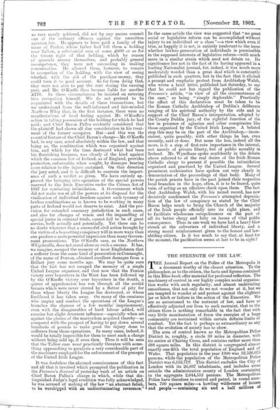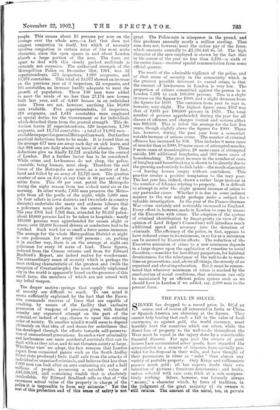THE STRENGTH OF THE LAW.
The area of control known as the Metropolitan Police District is, roughly, a circle 30 miles in diameter, with its centre at Charing Cross, and contains rather more than 688 square miles. In this district is congregated almost exactly one-fifth the total population of England and of Wales. That population in the year 1900 was 32,526,073 persons, while the population of the Metropolitan Police District was 6,553,719. This district excludes the City of London with its 26,897 inhabitants, and includes areas outside the administrative county of London containing in the aggregate 2,044,553 persons. The Metropolitan Police have therefore to control and patrol, in round num- bers, 700 square miles—a howling wilderness of houses and , people -- containing six and a half millions of people. This means about 15 persons per acre on the average over the whole area,—a fact that does not suggest congestion in itself, but which of necessity involves congestion in certain areas of the most acute character, since the open spaces in and about London absorb a large portion of the area. The force set apart to deal with this closely packed multitude is certainly not excessive. The authorised strength of the Metropolitan Police on December 31st, 1901, was 32 superintendents, 573 inspectors, 1,999 sergeants, and 13,373 constables. This total of 15,977 showed an increase on the previous year of 3 inspectors, 22 sergeants, and 105 constables, an increase hardly adequate to meet the growth of population. These 130 men were added to meet the needs of no less than 27,174 new houses built last year, and of 6,449 houses in an unfinished state. There are not, however, anything like 16,000 men available. Five superintendents, 53 inspectors, 219 sergeants, and 1,618 constables were employed on special duties for the Government or for individuals which detached them from the general strength. This de- duction leaves 27 superintendents, 520 inspectors, 1,780 sergeants, and 11,755 constables—a. total of 14,082 men— available onpaper for general Metropolitan work. But further practical deductions have to be made. It is found that on the average 477 men are away each day on sick leave, and that 884 men are daily absent on leave of absence. These deductions give us finally 12,721 available for the control of London. But a further factor has to be considered. While crime and lawlessness do not sleep, the police- constable, being human, must sleep. Therefore the evil forces of the Metropolis are never, as a, matter of fact, faced and foiled by an army of 12,721 men. The greatest number of men on duty at any time is 60 per cent. of the entire force. This 60 per cent. patrol the Metropolis during the night season from ten o'clock until six in the morning. In other words, 7,633 men preserve the Metro- polis from all the perils of the night, while 5,089 men (in four reliefs in town districts and two reliefs in country districts) undertake the many and arduous labours that a policeman must perform in the course of the day. The year 1901 had 1,901 fires, attended by 18,337 police; about 10,000 persons had to be taken to hospitals ; nearly 110,000 persons were apprehended for causes slight or grave; over 32,000 licensed drivers or conductors had to be watched. Such work for so small a force seems immense. The average for the whole Metropolitan District at night is one policeman for every 850 persons ; or, putting it in another way, there is on the average at night one policeman for every 58 acres of land. These figures, deduced from the Census returns and from Sir Edward Bradford's Report, are indeed matter for wonderment. The extraordinary sense of security which is perhaps the most striking characteristic of the greatest and (with the exception of Constantinople) the most notably unplanned city in the world is apparently based on the presence of this small force, the members of which are not armed with any lethal weapon.
The deeper motive - springs that supply this sense of security are difficult to reach. To one mind it seems sufficiently explained by the fact that the Execu- tive commands reserves of force that are capable of crushing, by means of the facility that exclusive possession of weapons of precision gives, with fearful severity any organised attempt on the part of the criminal, or indeed of any, classes to upset the existing order of society. To another mind it would seem to depend ultimately on that idea of and desire for orderliness that has developed through the efforts towards self-preserva- tion of unnumbered generations. In such a view criminality and lawlessness are mere accidental survivals that can be dealt with as they arise, and do not threaten society at large. Whichever view we adopt, the fact remains that London (apart from occasional panics such as the South Audley Street riots produced) feels itself safe from the attacks of individual or organised criminals, and believes that less than 8,000 men can look after an area containing six and a half millions of people, possessing a rateable value of %6,538,501, and containing wealth that is absolutely incalculable. Sir Edward Bradford tells us that of " the enormous actual value of the property in charge of the i Police it is impossible to form any estimate." Yet the colt of this protection and of this sense of safety is not great. The Police-rate is ninepence in the pound, and this produces annually nearly a million sterling. That sum does not, however, meet the entire pay of the force, which amounts annually to £1,396,441 6s. 5d. The high character of the men employed is shown by the fact that in the course of the year no less than 2,194—a sixth of the entire force—received special commendation from some official quarter.
The result of the admirable vigilance of the police, and of that sense of security in the community which is the greatest possible deterrent to casual crime, is that the amount of lawlessness in London is very low. The proportion of crimes committed against the person is in London 7,381 to each 100,000 persons. This is a slight increase on the figures for 1900, and a slight decrease from the figures for 1899. The variation from year to year is, however, very slight. The highest figure since 1867 was that of 9,036 per 100,000 persons in 1870. The total number of persons apprehended. during the year for all classes of offences and charges (venial and serious alike) was 109,534. This is below the average for the last five years, though slightly above the figures for 1900. There has, however, during the past year been a somewhat notable increase of serious crime. The number of criminal offences has increased by 838. This includes 8 more cases of murder than in 1900, 19 more cases of attempted murder, 9 more cases of manslaughter, 28 more cases of attempted suicide, 180 additional burglaries, and 303 more cases of housebreaking. The great increase in the number of cases of burglary and housebreaking is shown to be directly due to the growing and entirely foolish habit—the result of security —of leaving houses empty without caretakers. This practice creates a, positive temptation to the very poor. The last year has, indeed, shown a, rather large increase in the number of felonies relating to property. It is difficult to attempt to refer the slight general increase of crime to any particular cause. Whether it is due in some indirect manner to the war might perhaps make a, subject for •• valuable investigation. In the year of the Franco-German War crime certainly and noticeably increased in England. Every effort is, however, made in London to cope by means of the Executive with crime. The adoption of the system of criminal identification by finger-prints (in view of the opinion of Lord Belper's Committee) will introduce much additional speed and accuracy into the detection of criminals. The efficiency of the police, in fact, appears to have reduced crime to its minimum, in so far as a minimum can be secured by Executive efforts. The reduction of the Executive minimum of crime to a new minimum depends in a large degree upon the application of remedies to social disorders,—remedies for hereditary pauperism, for habitual drunkenness, for the reluctance of the well-to-do to waste time on prosecutions, and, above all things, the remedy of an organised and elevating education. But it must be remem- bered that whatever minimum of crime is reached by the amelioration of social conditions, that minimum can only be maintained by an efficient police system such as we should have in London if we added, say, 2,000 men to the present force.











































 Previous page
Previous page